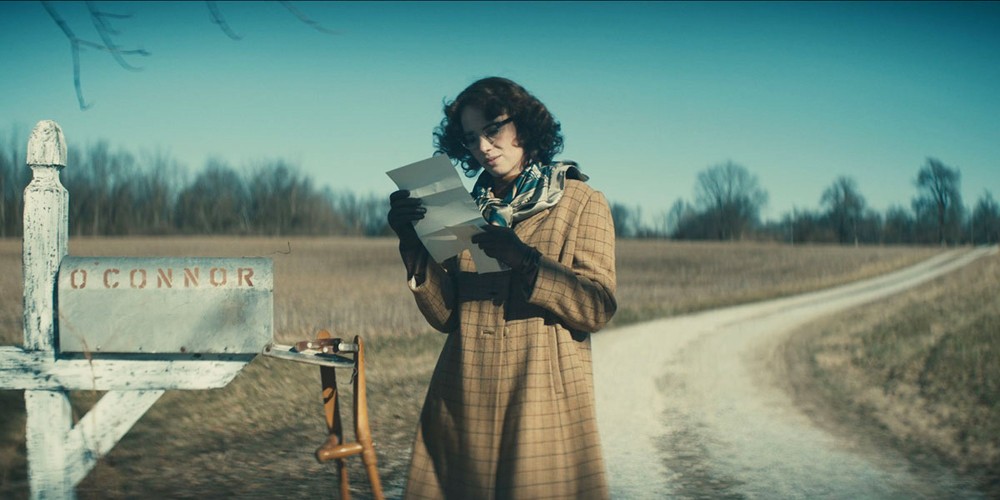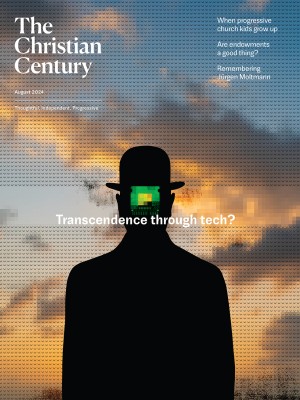Genius and virtue
Wildcat is less a biopic than a luminous exploration of the tension in Flannery O’Connor’s artistic and spiritual life.

“I don’t want your praise; I don’t want you to think I am clever,” Flannery O’Connor (Maya Hawke) says to the priest (Liam Neeson) who has come to offer her counsel and comfort. She is wracked with pain from lupus, forced to move from New York City back to her mother’s home in Georgia, and railing against the limitations of her new life. She and the priest have been discussing whether “scandalous writing” can serve God. She has been carrying on a philosophical argument largely with herself, using the priest as her foil. Then she sits up violently and practically spits out the words, “But I do want it!”
Wildcat (directed by Ethan Hawke) is less a biopic than a luminous exploration of the tension between ambition and virtue and the power of constraint as an artistic discipline. We meet O’Connor as a young writer in New York City, trying to pitch her unfinished novel Wise Blood to an editor who wants her to rein in her prickly, often scathing style. “I don’t think you need to make [your readers] suffer in order to introduce them to the unusual way your mind works,” he says pointedly. O’Connor refuses to revise her novel into a more acceptable form. She knows her style is also its substance, an unflinching attempt to see reality without sentimentality. She also believes, in her heart of hearts, that it might represent her genius.
Read our latest issue or browse back issues.
O’Connor both courts this genius and is terrified of giving in to her ambition. We watch her as a prize-winning young writer at the Iowa Writer’s Workshop, and then again in New York trading banter with Robert Lowell, already a famous poet. She is an outsider in these urbane situations, a southerner who writes about the South, a devout Catholic who writes about Christianity as though it might be more than a powerful myth. At a sophisticated dinner party where young writers attempt to outdo each other with wit and irony, writer Elizabeth Hardwick explains how she interprets the Catholic mass symbolically now that she has, presumably, outgrown it. “If the Eucharist is just a symbol, to hell with it,” O’Connor interjects bullishly. She moves through these spaces like an awkward ghost, haunting their edges, but we can see the hunger in her eyes.
When she moves back to the South because of her illness, she is just as much an outsider there. She lives with her mother and aunt, who treat her writing like the eccentric hobby of a petulant child. “Well, I don’t understand why you don’t want to write something people would like to read,” her mother (Laura Linney) says primly when O’Connor tries to share one of her recent stories. She rages and storms, lashing out at her mother, her town, the entirety of the South—but also, as in the scene with the priest, at the pride in her soul that believes she is destined for more than this confined life.
Viewers who know O’Connor’s work know that returning to the South will not confine her genius—it will be the key that unlocks it. It is impossible to imagine her style without its unflinching, sometimes brutal excavation of the southern culture that formed her, the pretension and morality that masquerade as virtue and the suffocating decorum that masquerades as morality.
It is notoriously hard to depict acts of creation on film, especially creation that takes place entirely in the mind. The movie weaves scenes from O’Connor’s fiction seamlessly into the flow of the film. We watch her observe ordinary details of life around her—the way a child makes faces on the bus, the unusual details on someone’s hat—then the scene shifts and we are inside her imagination, one of her stories beginning to take shape. Maya Hawke and Linney play the main characters in the stories depicted, taking on the primal roles of mother and child, and we realize that O’Connor’s writing was part of her spiritual excavation, as unflinching in its view of her own soul as those around her. But her stories are not just faithful depictions of reality, they are powerful acts of imagination that transform it.
O’Connor is often offered to young Christian intellectuals searching for models of how to merge a faithful life with intellectual or artistic pursuit. Given her midcentury context, a time when artists were flouting conventions and demanding self-expression and authenticity, much is made of her submission to the Roman Catholic hierarchy and devotion to Christian ritual. Wildcat does not downplay her faith or the seriousness with which she longs to submit her will to Christ. But it asks quite seriously, How do you submit your will to Christ and also strive to be a writer greater than Tolstoy, as O’Connor once confessed she longed to be?
The film explores the rigorous embrace of constraints as at once an artistic practice and a spiritual one. Near the end of the movie, there is a momentary armistice in the war of wills she wages with her mother. “At least you have that wonderful view to look at as you write,” her mother says, gesturing to a window looking onto a blooming tree. O’Connor smiles briefly, but as soon as her mother leaves, she exhausts her frail body moving her furniture so that she is only staring into a wall of furniture. This might be a final act of rebellion. Or the act of self-abnegation that opens the floodgates of her creativity.
The movie doesn’t suggest whether O’Connor ever fully reconciled the tension between ambition or virtue, or if she ever really believed her writing could be a path of spiritual growth. “Dear God, please,” she prays, “I can never seem to escape myself unless I’m writing, and strangely I am never more myself than when I’m writing. Is there no way for me to disappear into something bigger?” In a sense, this is what we have been watching all along.






